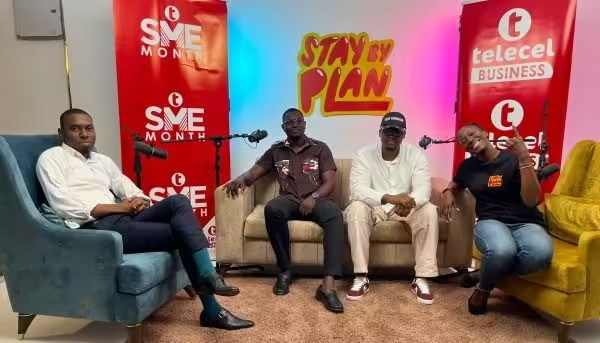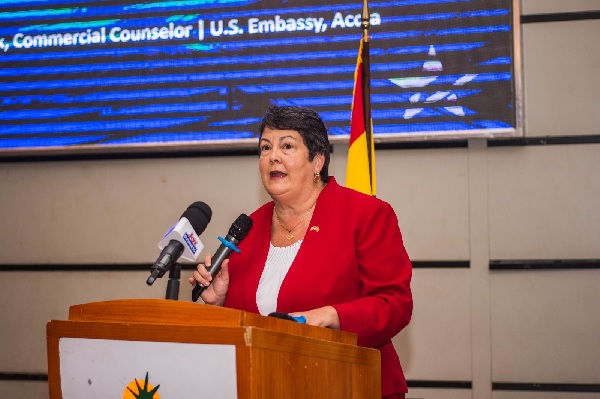Connecting Hustles podcast: Telecel discusses transforming side projects into full-time work.

Connecting Hustles podcast: Telecel discusses transforming side projects into full-time work.
As part of its Small and Medium-sized Enterprises (SME) Month, Telecel Ghana has created a podcast special named Connecting Hustles, featuring young business entrepreneurs and influencers who discuss their unique experiences and opinions on starting their entrepreneurial adventures.
‘Turning Side Hustles into Full-time Businesses’ is the theme of the first episode of the two-part podcast series, which is exclusively hosted on the rapidly growing youth podcast platform Stay by Plan. The co-founder of Dance with Purpose (DWP) Academy and talent manager Quables, as well as Edwin Amaglo, owner of Wolf Autoworks, were featured on the program. Both guests have effectively made the shift from side gigs to full-time businesses.
Telecel Ghana thinks the two-episode Connecting Hustles podcast talk will connect with young company owners and those in the gig economy to help build their SMEs, as young entrepreneurs and gig workers are a rapidly expanding group.
The Connecting Hustles conversation, co-moderated by content creator and podcast host Afi Tsegah and Citi FM & Channel 1 TV broadcaster Jude Duncan, teaches young entrepreneurs and gig economy practitioners about practical and realistic ways to turn their side projects into successful full-time businesses.
modest beginnings
Edwin began his career in automotive photography out of pure enthusiasm. His love of taking unique shots of sports, luxury, and vintage cars inspired him to follow this line of work. “I started out with an IT background and worked in tech support in a couple of companies. I occasionally worked as a side gig ordering other auto parts and selling dash cams. Before I had my own workshop, I worked as a partner with a friend to learn auto repair, and it has been rewarding ever since. It gives me great satisfaction every day to be able to help folks with their endless list of car issues and to watch them drive and enjoy their vehicles.

Quables founded the dance academy by overseeing a dancer buddy named Dancegod Lloyd, capitalising on his success as a social media influencer and photo model at Kwame Nkrumah University of Science and Technology (KNUST). His previous experience in the advertising sector enabled him to use branding and viral marketing techniques to raise the dancer’s profile, which helped him create his business plan for further dance talent.
“The need for some kind of fulfillment served as the driving force. My greatest accomplishment has been to help young dancers in Ghana realise that dancing can be a full-time career and that they can earn money from their skills.
The potency of electronic media
Developing a digital infrastructure is essential to growing a side project into a full-time company. Both Edwin and Quables agreed that digital media played a significant role in the success of their respective trades.
Right now, it’s the lifeblood of my whole company. Social networking has helped my business tremendously by facilitating client acquisition. People who found my business online make up the majority of my current clientele. Edwin stated, “I will counsel any young person to use social media and the internet to help grow your business.”
Quables looked for creative ways to monetise the dance abilities of the performers he was managing because his trade wasn’t profitable. He first used YouTube to display their skills, but he had trouble gaining a sizable following. Acknowledging social media’s potential, DWP deliberately redirected their attention to Instagram and TikTok, which helped them draw in a larger following and earn brand recognition.
“Digital planning and branding were essential to DWP’s social media use. Our ability to simultaneously market the academy and individual talents has allowed us to amass a sizable internet following in the millions, without social media and internet connectivity.
converting to a full-time business role
Edwin gave advice to young entrepreneurs, saying that they must always learn new things and keep up with industry developments in order to avoid becoming obsolete and failing to turn their side projects into long-term ventures.
To be honest, you will be stuck and fighting for scraps if you don’t learn. To avoid being mired in the past, keep up with emerging trends. For instance, modern automobiles are moving computers, so I’ll be limited to mending older cars if I don’t continuously learn how to stay up to date with new models and their software, Edwin remarked. Find something you enjoy doing that doesn’t feel like a chore as well. Something should always be driving you to stay there, and ultimately you will begin to make money doing it.
According to Quables, young people shouldn’t prioritise money over all other considerations when starting a business. Based on his ten years of expertise, it is more crucial to understand the worth and goal of your company before anything else.
“The primary driving force shouldn’t be money because it is very simple to give up on a path if you are focused on money and feel that the profits are not being made.” There have been moments when I’ve wanted to give up, but I feel like I’m connected to so many people, and my job is to help them develop jobs that will sustain them long after they can no longer dance,” Quables continued.
Watch the entire exchange.
Listen to the entire one-hour Connecting Hustles talk on Telecel channels on X, Facebook, LinkedIn, and YouTube, in association with the Stay by Plan podcast. The Connecting Hustles talk offers insightful information that could influence your entrepreneurial journey, regardless of whether your goal is to develop your side hustle further or turn your passion project into a career. The last week of September will see the release of the final episode of the Connecting Hustles podcast, which is focused on marketing for SMEs.








